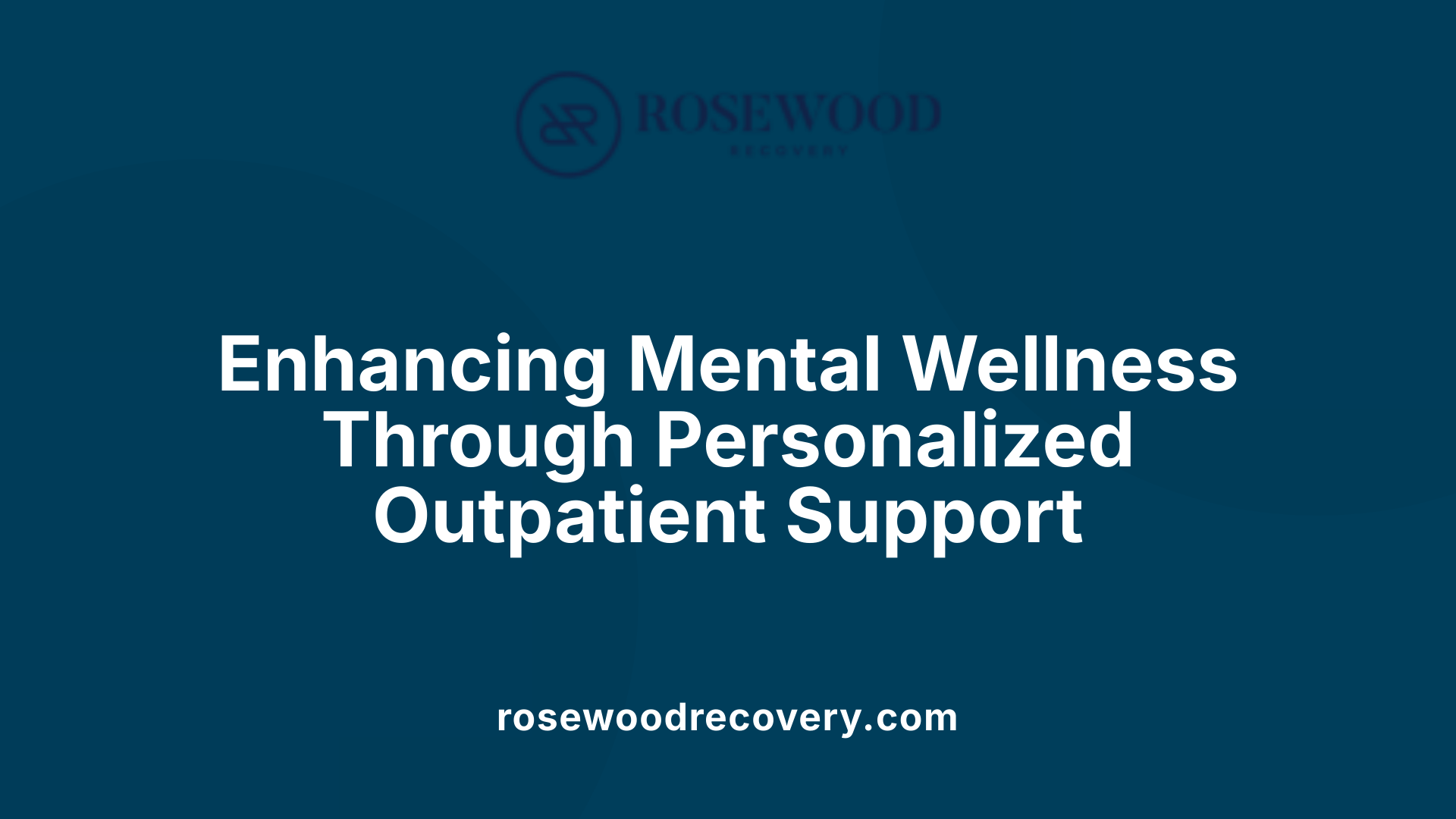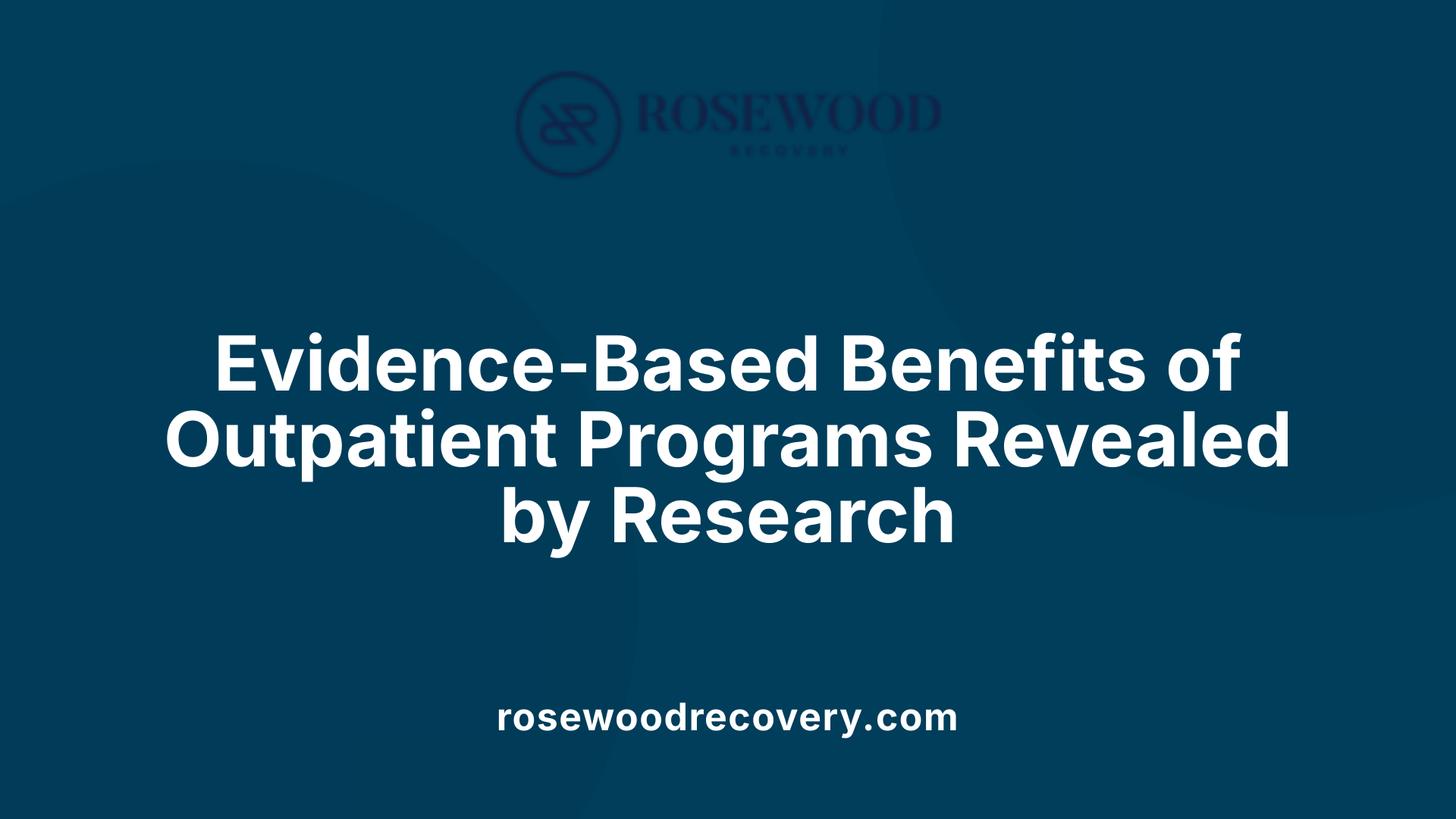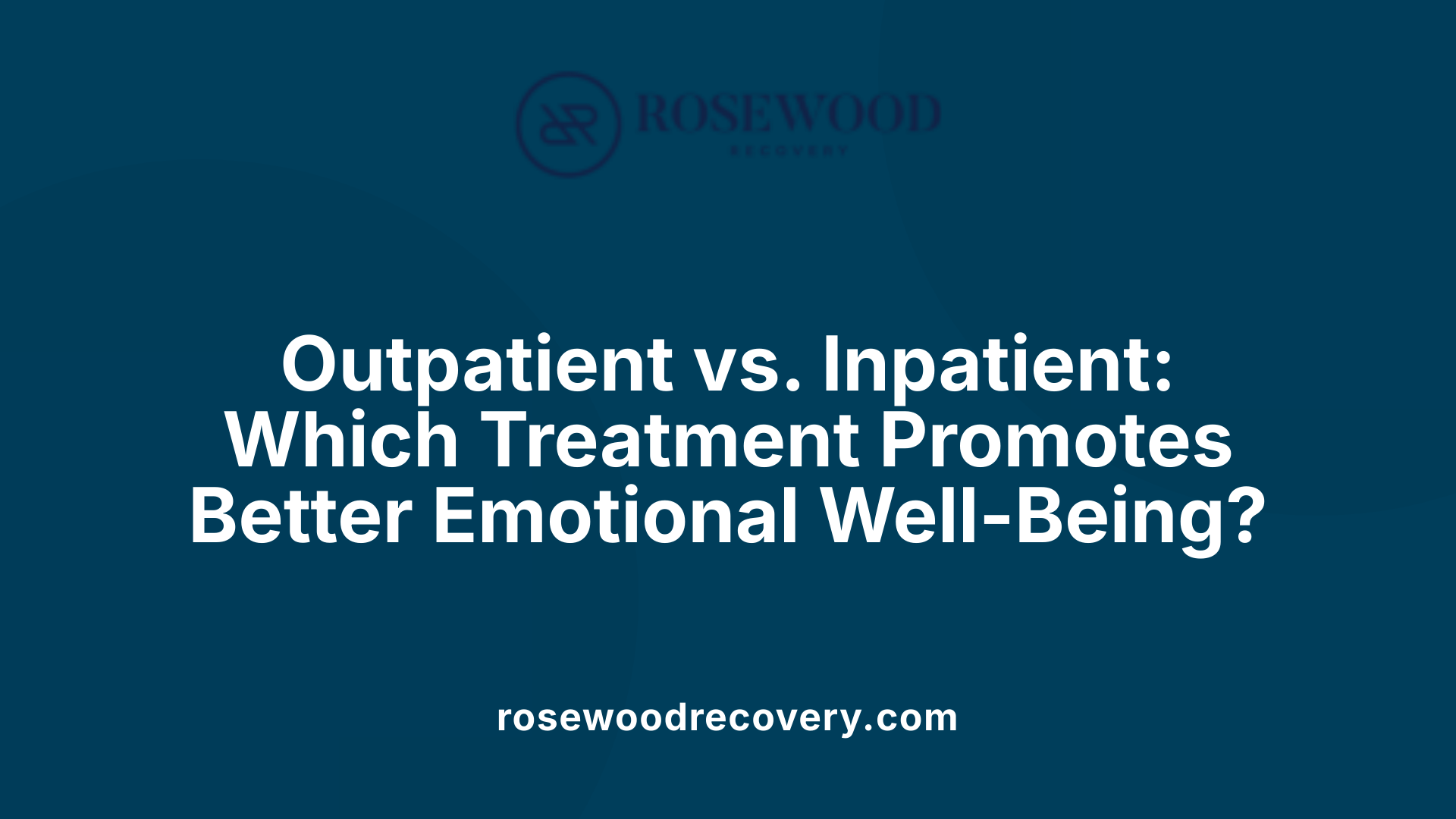Understanding the Power of Ongoing Support
Long-term outpatient care has emerged as a vital approach in mental health and physical health management, providing continuous support that fosters emotional resilience, stability, and independence. This article explores the emotional benefits, scientific backing, and practical advantages of sustained outpatient treatment, highlighting its role in enhancing quality of life for individuals with diverse needs.
The Psychological and Emotional Benefits of Long-Term Outpatient Care

What are the emotional and psychological benefits of long-term outpatient care?
Long-term outpatient care provides a vital foundation for emotional stability and mental well-being. By allowing individuals to receive sustained support while remaining engaged in their daily routines, these programs promote a sense of security and self-confidence.
One significant advantage is the development of coping skills. Patients learn practical strategies like mindfulness, stress management, and techniques for relapse prevention. These skills help bolster resilience and foster a greater sense of self-awareness, empowering patients to manage their emotions more effectively.
Outpatient programs also encourage personal growth through self-awareness and emotional regulation. Participants gain insight into their emotional triggers and learn to regulate their responses, all within a real-world context. This environment supports the gradual, sustainable development of healthier behavioral patterns.
Furthermore, outpatient care facilitates lasting behavioral change. Through consistent therapy sessions—be it individual, group, or family therapy—patients work on modifying maladaptive behaviors and improving self-image. The personalized approach adapts to each individual's needs, optimizing the chances of maintaining progress.
A supportive environment is a cornerstone of outpatient programs. These programs create a space for emotional exploration where individuals can openly discuss concerns, understand their feelings, and build meaningful relationships. The variety of services offered—such as counseling, group therapy, and psychoeducation—further enhances this supportive atmosphere.
Flexibility is another benefit. Outpatient care can be tailored to fit personal schedules, helping patients sustain their routines and support networks. This adaptability fosters continued engagement, making long-term commitment to mental health more manageable.
In summary, long-term outpatient mental health programs cultivate emotional resilience, facilitate the development of coping strategies, promote behavioral change, and provide a nurturing environment for emotional growth. They help individuals not only recover but thrive, ensuring ongoing mental wellness and improved quality of life.
Impact of Outpatient Care on Mental and Emotional Well-Being
 Ongoing outpatient mental health care plays a crucial role in promoting emotional resilience and improving overall mental health. These programs, including Intensive Outpatient Programs (IOPs) and Partial Hospitalization Programs (PHPs), offer flexible treatment options that allow individuals to continue living at home while receiving care.
Ongoing outpatient mental health care plays a crucial role in promoting emotional resilience and improving overall mental health. These programs, including Intensive Outpatient Programs (IOPs) and Partial Hospitalization Programs (PHPs), offer flexible treatment options that allow individuals to continue living at home while receiving care.
The support provided through outpatient services is personalized to meet each patient's unique needs. This individualized approach helps in applying coping strategies consistently in daily life, which is vital for managing symptoms and preventing relapse.
While outpatient care alone may not always fully reduce symptoms of mental health disorders, it significantly enhances overall functioning. Evidence suggests that continuous, integrated support can lead to better long-term outcomes, fostering a sense of stability and control.
An important benefit of outpatient care is maintaining daily routines, including work, social activities, and family interactions. This continuity helps individuals feel more connected to their community, reducing feelings of isolation.
Furthermore, outpatient programs frequently incorporate support systems such as group therapy, family involvement, and holistic care that considers physical health and lifestyle factors. These elements collectively contribute to improved emotional well-being.
In summary, if well-structured and sustained, outpatient mental health care not only supports ongoing recovery but also empowers individuals to manage their conditions effectively, promoting long-term mental and emotional stability.
Long-Term Outpatient Care's Role in Fostering Emotional Stability, Independence, and Recovery

How does long-term outpatient care support emotional stability, independence, and recovery?
Long-term outpatient care plays a crucial role in helping individuals achieve and sustain emotional stability. It offers ongoing support through regular therapy sessions, psychoeducation, and self-care strategies that empower patients to develop effective coping skills and resilience. This continuous assistance helps address emotional challenges promptly, reducing the likelihood of setbacks.
Additionally, outpatient programs incorporate early warning systems that identify signs of relapse or emotional distress, allowing for proactive intervention. This vigilance ensures that individuals can manage their mental health proactively rather than reactively, fostering a sense of control and confidence.
Structured programs like Intensive Outpatient Programs (IOPs) focus on skill development in areas such as emotional regulation, communication, and stress management. These programs enable participants to practice new skills in real-life settings, which supports long-term recovery and emotional independence.
Family involvement is another vital aspect of outpatient care. Including loved ones in treatment plans creates a supportive environment that reinforces progress and understanding, further strengthening emotional well-being.
Personalized treatment plans tailor interventions to each individual’s needs, promoting more effective outcomes. This tailored approach ensures that recovery strategies are relevant and achievable for each person.
Overall, consistent outpatient support helps maintain the gains achieved through initial treatment. It provides a stable foundation for long-term mental health, enabling individuals to live more independently and enjoy a higher quality of life.
What are the benefits of structured programs and skill-building?
Structured programs such as IOPs and Partial Hospitalization Programs (PHPs) provide a framework for ongoing recovery. They include activities designed to build essential life skills—emotional management, healthy communication, and coping strategies—that are critical for long-term stability.
These programs also offer flexibility, allowing individuals to continue managing daily responsibilities while participating in therapy and skill-building exercises. This combination of structure and independence makes recovery sustainable.
How do family involvement and personalized treatment enhance outpatient care?
Involving family members in treatment helps create a network of support and understanding. Family education and participation can improve communication and reduce misunderstandings, which are common stressors that can trigger relapse.
Personalized treatment plans address specific challenges and strengths of each individual, fostering a sense of ownership and motivation in the recovery process. Tailoring care increases engagement and effectiveness.
How is the maintenance of recovery gains achieved?
Maintaining progress after outpatient treatment involves regular follow-ups, continued participation in support groups, and ongoing therapy sessions. These help reinforce skills, monitor mental health, and address emerging issues early.
Self-care routines, including stress management techniques, building a support network, and practicing healthy lifestyle habits, are integral to sustaining recovery.
Participation in ongoing professional and peer support provides a safety net, reducing feelings of social isolation and promoting resilience.
By combining structured programs, family support, personalized care, and ongoing maintenance strategies, outpatient care ensures long-term emotional well-being, independence, and resilience against relapse.
Scientific Evidence Supporting the Emotional Benefits of Outpatient Care
 Research consistently shows that outpatient mental health programs can significantly improve emotional well-being. These programs include treatments like Intensive Outpatient Programs (IOPs) and Partial Hospitalization Programs (PHPs), which vary in their structure and intensity. Studies have found that participation in such outpatient services can lead to substantial reductions in symptoms of depression, anxiety, post-traumatic stress disorder (PTSD), and substance use disorders.
Research consistently shows that outpatient mental health programs can significantly improve emotional well-being. These programs include treatments like Intensive Outpatient Programs (IOPs) and Partial Hospitalization Programs (PHPs), which vary in their structure and intensity. Studies have found that participation in such outpatient services can lead to substantial reductions in symptoms of depression, anxiety, post-traumatic stress disorder (PTSD), and substance use disorders.
Evidence-based therapies like cognitive-behavioral therapy (CBT) and prolonged exposure therapy are often incorporated into outpatient care. These approaches have proven effective in helping patients manage emotional distress, develop better coping skills, and sustain recovery. Patients report higher satisfaction levels with social roles and daily functioning after engaging in outpatient treatment, highlighting its positive impact on emotional health.
Transitioning smoothly from inpatient to outpatient care also plays a crucial role. Outpatient programs facilitate this transition, allowing individuals to continue their recovery while maintaining their routines and support systems. This continuity is vital for long-term emotional stability and relapse prevention.
Moreover, outpatient mental health services help reduce the likelihood of hospitalization by addressing issues early and providing ongoing support through regular therapy and peer groups. Such support fosters resilience, emotional regulation, and social connectedness.
In summary, scientific research underscores outpatient treatment as an effective, evidence-based approach to enhancing emotional well-being. It offers a practical pathway for individuals to achieve better mental health outcomes, maintain stability, and improve their quality of life over the long term.
| Study Focus | Main Findings | Implications |
|---|---|---|
| Symptom reduction | Significant decrease in depression, anxiety, PTSD symptoms | Validates outpatient therapy effectiveness |
| Therapies used | CBT, exposure therapy, holistic approaches | Supports evidence-based practice |
| Transition outcomes | Better adjustment from inpatient to outpatient | Ensures seamless recovery process |
| Support system | Ongoing peer and professional support | Maintains emotional stability |
| Long-term effects | Improved emotional resilience and reduced relapse | Highlights importance of continuous care |
Comparing Outpatient and Inpatient Care in Emotional Outcomes

How does outpatient care compare to inpatient care in terms of emotional outcomes?
Research indicates that both outpatient and inpatient treatments for depression and other mental health conditions show strong effectiveness. The effect sizes, which measure treatment impact, are quite large for both approaches — ranging from 1.10 to 1.76 — suggesting significant improvements in patient outcomes.
After six weeks of treatment, no notable differences are observed between outpatient and inpatient care in terms of overall success. Patients whose treatment occurs on an outpatient basis often display higher response rates, meaning they experience more symptom relief and improved mental health. These patients tend to participate more actively in their treatment plans, showing greater engagement as reflected in self-assessments and evaluations by therapists.
Cost is an important factor. Outpatient programs are generally more affordable than inpatient care, with lower overall medical expenses. In fact, patients receiving outpatient treatment often have fewer hospital days in the following year, reducing both economic and emotional burdens.
While inpatient care offers Round-the-clock monitoring and is suited for severe cases requiring intensive supervision, outpatient treatment emphasizes ongoing support and integration into the individual's normal daily routine. This approach fosters stability and independence, which are vital for long-term emotional health.
In summary, both treatment methods are effective, but outpatient care's less restrictive environment can lead to enhanced emotional well-being and independence, especially in cases that are less severe.
| Aspect | Outpatient Care | Inpatient Care | Additional Details |
|---|---|---|---|
| Effectiveness | High; comparable to inpatient | High; comparable to outpatient | Measures include effect sizes from studies |
| Engagement | Higher response and participation | Variable; intense focus but less ongoing engagement | Response rates tend to be higher in outpatient contexts |
| Cost | Generally lower | Typically higher | Costs impact long-term planning |
| Long-term Impact | Supports emotional stability and independence | Ensures safety and intensive support | Suitable for different severity levels |
| Suitability | Less severe cases, ongoing management | Severe cases requiring close monitoring | Decision depends on individual needs |
Both outpatient and inpatient options have their advantages, and choosing the right approach depends on the patient's specific condition and support system. Ultimately, outpatient care offers a sustainable, effective alternative for many, promoting long-term emotional health and independence.
The Emotional Rewards of Long-Term Outpatient Care for All Conditions
Long-term outpatient care plays a significant role in improving emotional well-being across various health conditions, including physical illnesses, mental health issues, and addiction recovery. These programs provide ongoing support, allowing individuals to manage their conditions effectively while maintaining their daily routines.
For patients with physical illnesses such as heart disease, cancer, or HIV, emotional well-being directly correlates with recovery and survival. Studies show that higher levels of positive affect and general well-being are linked to better treatment outcomes and long-term prognosis. A meta-analysis revealed an overall likelihood ratio of 1.14, indicating a tangible positive relationship between emotional health and physical recovery.
Similarly, individuals facing mental health challenges benefit from outpatient mental health programs like Intensive Outpatient Programs (IOPs) and Partial Hospitalization Programs (PHPs). These flexible treatment options allow for meaningful therapy sessions, social interaction, and community engagement—all crucial for emotional resilience. Holly Hill Hospital’s programs, designed for individuals of all ages, aim to support long-term mental stability through personalized care and holistic approaches.
Addiction recovery also thrives in outpatient settings, where patients can receive continuous counseling, peer support, and education. Such programs help sustain sobriety, prevent relapse, and build social connections essential for a balanced life.
A core advantage of long-term outpatient care is its focus on social support and community integration. Regular therapy, participation in support groups, and access to supportive professionals reduce feelings of loneliness and depression. Maintaining these connections fosters a sense of belonging, which is vital for emotional health.
Another benefit is the ability to adapt treatment based on individual needs, encouraging a person-centered approach that enhances both emotional well-being and physical health. These programs aim not only at symptom management but also at improving quality of life and emotional resilience.
In summary, long-term outpatient care offers a comprehensive framework that integrates clinical treatment with emotional and social support. This approach helps individuals navigate their health journeys more effectively, promoting recovery, sustainability, and overall well-being.
| Condition Type | Program Types | Emotional and Social Benefits | Remarks |
|---|---|---|---|
| Physical Illnesses | Outpatient clinics, rehab programs | Improved recovery chances, reduced stress, optimism | Supports ongoing health management |
| Mental Health Issues | IOPs, PHPs, therapy groups | Reduced loneliness, resilience, stability | Long-term emotional support essential |
| Addiction Recovery | Support groups, counseling | Sustained sobriety, social reintegration | Reduces relapse risk |
Engaging in long-term outpatient care is vital for fostering emotional growth, restoring confidence, and empowering individuals to lead healthier, more fulfilling lives.
Fostering Long-Term Mental Resilience and Well-Being
The evidence underscores the crucial role of long-term outpatient care in fostering emotional stability, promoting independence, and enhancing overall quality of life. Its flexibility, personalized approaches, and continuous support help individuals develop resilience, sustain recovery, and enjoy emotional rewards that contribute to healthier and more fulfilling lives. Recognizing the scientific backing and the emotional benefits, healthcare providers and families are encouraged to prioritize sustained outpatient programs as a key component of holistic health management.
References
- The impact of emotional well-being on long-term recovery ...
- Eight Benefits of Outpatient Mental Health Programs
- The Emotional and Financial Benefits of Choosing Long- ...
- Benefits of Long-Term Care for Mental Health
- Long-Term Mental Health Planning After Outpatient Program
- The effect of hospitalization on patients' emotional and ...
- The Relationship between Outpatient Mental Health ...
- Kindness, Listening, and Connection: Patient and Clinician ...
- What Is Outpatient Mental Health Treatment?




